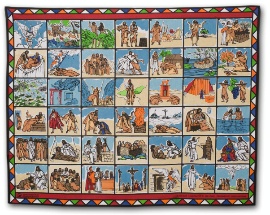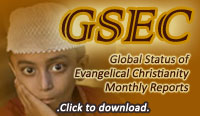Do you train your short term missions trip participants for cross-cultural ministry? You should, to help them understand the cultural difference they will encounter and how to deal with them. It is key that they understand that their actions have the ability to either help or hinder the long term missionary efforts on the field they serve. Often the difference comes back to cross-cultural preparedness. Here are some resources to help you lead a basic one-hour class on preparing for cross-cultural ministry.
Back Online
After over a year away – we’re back online. In the last year, I’ve put this site on the back burner as I got married and moved. I plan to get back in the swing of things soon, writing articles to help you as a missionary. You’ll also see articles from my wife, Amy, as well.
About Amy
Amy has been fascinated by missions work from an earlier age when her parents read aloud missionary biographies. She has participated in short term mission trips, ministered in ESL ministries and hung out with as many internationals as she could meet. She worked in the Information Technology department at a Christian university in the South before becoming the office manager at a Christian camp in North Carolina. She gave it all up to marry Jonathan and is currently a stay-at-home wife who assists with book reviews, research and brainstorming.
Be sure to follow us on Facebook or Twitter. Blessings – Jonathan.
TinyURL
Create a custom shorter URL
| Enter a URL | |
| http://tinyurl.com/ | |
| May contain letters, numbers, and dashes. |
Here is a solution for those URLs (website addresses) that go on forever. Often the links get broken in an email if they are too long, and can also be difficult to type or read over the telephone. At TinyURL.com, you can create a much shorter URL for free. Just go to their site and paste the log URL and wha-la… a short version. You can even create custom URLs instead of the automatically generated ones.
1 Corinthians 13 – A Guide to Culture
If I speak with the tongue of a national, but have not love, I am only a resounding gong or a clanging cymbal.
If I wear the national dress and understand the culture and all forms of etiquette, and if I copy all mannerisms so that I could pass for a national but have not love, I am nothing.
If I give all I possess to the poor, and if I spend my energy without reserve, but have not love, I gain nothing.
Love endures long hours of language study, and is kind to those who mock his accent; love does not envy those who stayed home; love does not exalt his home culture, is not proud of his national superiority,
Does not boast about the way we do it back home, does not seek his own ways, is not easily provoked into telling about the beauty of his home country, does not think evil about this culture;
Love bears all criticism about his home culture, believes all good things about this new culture, confidently anticipates being at home in this place, endures all inconveniences.
Love never fails: but where there is cultural anthropology, it will fail; where there is contextualization it will lead to syncretism; where there is linguistics, it will change.
For we know only part of the culture and we minister to only part.
But when Christ is reproduced in this culture, then our inadequacies will be insignificant.
When I was in America I spoke as an American, I understood as an American, I thought as an American; but when I left America I put way American things.
Now we adapt to this culture awkwardly; but He will live in it intimately: now I speak with a strange accent, but he will speak to the heart.
And now these three remain: cultural adaptation, language study, and love.
But the greatest of these is love.
Planning
No one plans to fail… they just fail to plan. Do you have a plan for your ministry? A good plan helps you understand what you need to do to accomplish your goals and helps you make decisions about time, staff, and finances. Planning allows you to do things now to make these future events a reality. But how do you develop a plan? There are two basic types of plans – strategic plans and action plans. Strategic plans (or master plans) are documents that establish ministry objectives for several years and determine the direction of your ministry. Often these plans are made in special planning meetings by the senior leaders with input from various stakeholders. Action plans are plans to carry out specific parts of the overall strategic plan. These include plans for programs and events, such as camps, conferences, training events, or other projects. Below are some resources from CIVICUS that can help you plan more effectively.
URL Shorteners
Do you use a URL shortener? This is an easy-to-use tool that can help you share websites with others. URL stands for uniform resource locator, which is the technical name for a website link, such as http://www.missionaryhelp.com Some, like this are simple, while others are more complex, or much longer. For instance, I shortened the link to a book at Amazon from http://www.amazon.com/Hamster-Revolution-Manage-Manages-Business/dp/1576755738/ref=sr_1_1?ie=UTF8&s=books&qid=1301868103&sr=1-1 to http://tinyurl.com/hamsterrevolution Click here to use TinyURL.
Reasons to use a URL shortener
- To keep a long address from wrapping to a second line and breaking in an email
- To make a long address fit in a text message or Twitter post
- To make it easy to memorize a website address
- To hide an advertising affiliate link
- To make it easier to share a link over the phone
- To make a link better looking
- To track how many people follow that unique link to your website
- To hide a free online website or file sharing site with a strange name
Common URL shorteners
Currency Converter Cheatsheet
Brian Stark at DELTA Ministries pointed out a neat tool for making your own business card sized currency conversion cheat sheet. OANDA offers a easy to print business card size summary of how much the local currency is worth in a currency more familiar to you. Click here, choose your currencies, and click the tab labeled “Traveler’s Cheatsheet.”
Bible Story Cloth
 Have you used a Chronological Bible Storying cloth? This cloth is designed is designed to communicate Bible stories to oral learners. It contains color illustrations of 42 key Bible stories. The cloth is easy to take on missions trips, hang on a wall, and also works great for small groups, Sunday School, or family devotions.
Have you used a Chronological Bible Storying cloth? This cloth is designed is designed to communicate Bible stories to oral learners. It contains color illustrations of 42 key Bible stories. The cloth is easy to take on missions trips, hang on a wall, and also works great for small groups, Sunday School, or family devotions.
Order from the IMB
Download the Story Guide (docx)
Download the Story Guide (pdf)
Deterring Vehicle Theft

There are several things that you can do to deter automobile theft. The key concept is to make your vehicle undesirable to a thief. This is the idea of target hardening. Thieves look for vehicles that can easily blend in to the traffic and popular models with a large used parts market. Here are some things you can do to deter thieves, particularly if you have a common model.
- Always lock your doors
- Keep your windows up
- Install a car alarm
- Install a gear shift lock (in the picture) or steering wheel lock

- Etch your registration number on the glass/paint your registration number on the vehicle
- Paint your vehicle so that it is unique and easy to spot (see picture)
- Uglify your mirrors and lights to avoid theft with stickers, etching, or breaking
- Hide valuables out of site
- Keep a dog in your car
- Park in lots with guards/attendants
- Park in lighted areas
- Disconnect distributor cap or battery if leaving for a long period of time
Global Status of Evangelical Christianity
 How can we effectively measure progress in our efforts to to fulfill the Great Commission? One way is to measure the growth of global Christianity. The IMB Global Research Department has committed themselves to conducting the same research for a long time. They have built a database of people groups and annually measure the strength of churches among each people group. They call this the Global Status of Evangelical Christianity (GSEC). Click to download the data and view reports, which are updated monthly.
How can we effectively measure progress in our efforts to to fulfill the Great Commission? One way is to measure the growth of global Christianity. The IMB Global Research Department has committed themselves to conducting the same research for a long time. They have built a database of people groups and annually measure the strength of churches among each people group. They call this the Global Status of Evangelical Christianity (GSEC). Click to download the data and view reports, which are updated monthly.
